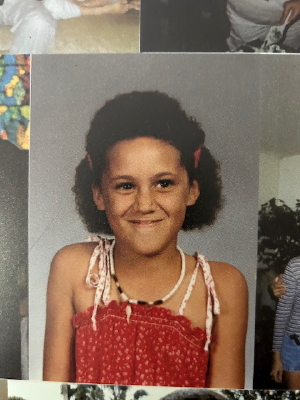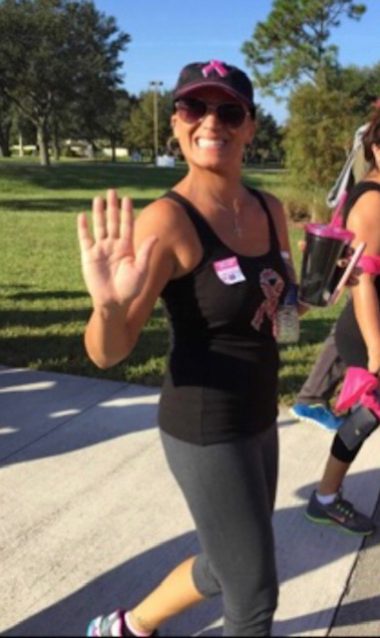Florida Woman Developed Breast Cancer After Decades of Chemical Hair Straightener Use
Michele Lynn was the kind of woman people just gravitated to, and she made friends wherever she went. A dedicated wife and mother, the Florida native was someone who enjoyed life and cared for others.
She was happiest when she was in the company of friends, exercising and spending time on the Florida beaches in her flip-flops and tank tops. Michele loved savoring a glass of wine, going on date nights and traveling. She also loved volunteering in her community and devoted much of her free time to helping others.
Her husband, Mike, recalls, “I fell in love with her at first sight. It was her smile, her kindness and her compassion for other people. She was an angel, and her love for life was infectious. We were together for 25 years and married for 21 when she passed.”
At age 38, Michele was diagnosed with breast cancer, despite a lack of any genetic predisposition or family history. The couple never linked Michele’s long-term use of chemical hair relaxers, a habit since her early teens, to her cancer.
“If there were a warning on those products, she wouldn’t have kept using them. She would have stopped immediately. These companies put money before people’s lives, and all they care about is what’s hitting their bank account.”
Despite Michele and Mike’s best efforts to fight the disease, Michele passed away from breast cancer complications when she was just 43 years old.
“If there were a warning on those products, she wouldn’t have kept using them. She would have stopped immediately. These companies put money before people’s lives, and all they care about is what’s hitting their bank account,” Mike said.
Michele is survived by her husband, Mike, and their two children. Mike told Michele’s story to Drugwatch in the hope that it would help warn others and spread awareness about the risk of chemical hair straighteners. Their last names are omitted to protect their privacy.
Connecting Hair Straighteners to Cancer Risks
Michele’s diagnosis left the couple in disbelief. Michele didn’t have a family history, and she watched her weight, ate right, exercised and didn’t take any medications. She wouldn’t even take pain relievers unless she absolutely needed them.
“She was always very healthy and very fit,” Mike said. “She never smoked, wasn’t a heavy drinker and wasn’t overweight. When she was diagnosed, the BRCA test showed she wasn’t a gene carrier, so it wouldn’t affect our daughter.”
After Michele’s passing, Mike discovered research connecting chemical hair straighteners to cancer. Suddenly, it made sense why a healthy young woman with no family history or genetic predisposition could develop breast cancer.
“I’m like, wait a second. You know, she’s been straightening her hair since she was a kid. Maybe that’s where the cancer came from. She used it four or five times a year,” Mike said.
“... She's been straightening her hair since she was a kid. Maybe that's where the cancer came from. She used it four or five times a year.”
A 2019 NIH study linked chemical hair straighteners to an increased risk of breast cancer. In this study, scientists found women who used chemical hair straighteners every five to eight weeks had a 30% increased risk of breast cancer.
Another study published in Carcinogenesis also linked hair relaxers to an increased risk of breast cancer. Michele had TN type breast cancer, which is mentioned in this study, Mike said.
In addition, an October 2022 study called the Sister Study found women who used chemical hair straighteners more than four times a year had more than double the risk of uterine cancer.
As of February 2024, there are more than 8,200 federal chemical hair straightener lawsuits in Illinois multidistrict litigation over failures to warn about cancer risks. Named in the lawsuits include the makers of Dark and Lovely, Soft & Beautiful and L’Oréal products.
Michele Felt Pressured To Use Hair Straighteners as a Child
As a woman of mixed race, chemical hair straighteners had been a part of Michele’s life since she was a preteen when she was mercilessly teased for her curly hair. She continued to use them regularly four to five times a year because of societal pressure to keep her hair straight.

Michele grew up with a white mother and a white family but felt caught in the middle of two races as a biracial child.
“The white kids would make fun of her hair, and she was too white to fit in with the Black kids. She was bullied and felt uncomfortable with both races,” Mike said.
"I remember she used to get scabs on her scalp from where the hair straighteners would burn her head. I told her to stop using the straighteners, but it was important for her to keep her hair straight because of the pressure she felt to fit in."
Michele started using hair straighteners and relaxers to keep her hair straight to avoid some of the social ridicule she faced. As soon as the curls started to come back in, she would straighten it again.
Today, chemical hair straightener lawsuits claim that the makers of these products targeted women of color in their marketing. In the Sister Study, researchers found that 60% of study participants who used hair straighteners self-identified as Black women.
Michele’s Breast Cancer Journey
Michele tackled the breast cancer challenge just like any other challenge in her life by intending to conquer it. She fought hard, undergoing chemotherapy, immunotherapy and multiple surgeries — even a double mastectomy. She and Mike traveled abroad for experimental homeopathic treatments.
“She was so strong and positive. You would never know she had breast cancer if you met her. She had no doubt in her mind that she was going to beat this thing. The only time she slowed down was right after chemotherapy. She would curl up into a ball for a couple of days. But then she was back on her feet again,” Mike remembered.
Fighting cancer during the COVID-19 pandemic made things even more difficult. Mike remembered getting COVID and having to quarantine. He would watch his wife through the door of the room where he was quarantined and see Michele curled up in a ball on the couch after chemotherapy, unable to comfort her.
To get to Michele’s experimental treatments in Spain, he had to get special paperwork to travel during the pandemic.
Their friends and community also supported Michele. Her son’s soccer team wore pink shirts to support her fight. For a while, she felt better.
“She was so strong and positive. You would never know she had breast cancer if you met her. She had no doubt in her mind that she was going to beat this thing.”
But towards the end of her journey, she started to slow down. She would get more tired. The cancer spread to her throat, and it was inoperable. She had problems talking.
Then, when the cancer spread to her liver, her abdomen filled with fluid. After the procedure to drain the fluid, her limbs started swelling. She was throwing up and vomiting. The following day, she was worse, but she didn’t want to go to the hospital because she wanted to sleep in her bed.
“That was the last night we spent together. That Sunday morning she wasn’t responsive at all, and I called an ambulance. She had developed sepsis, and all her organs were shutting down. On Monday, the hospital staff were telling me to take her off of life support. On Tuesday, I finally agreed. They took her off the machines, and she lasted four hours,” Mike remembered.
Because Mike and Michele were never warned about the potential risks of chemical hair straighteners, Michele still used them throughout her battle with cancer.
Remembering Michele
“I took Michele’s death hard. I’m still taking it hard. I had a pretty successful roofing business and I just gave it up. I didn’t even sell it. I just gave it away because I couldn’t take it anymore. The kids are the reason I’m here,” Mike said.
In the wake of Michele’s death, Mike’s strong and supportive family structure is a big help. Both his kids are in college now, and he works from home.
“I don’t go out much. I just don’t want to, and I don’t go to an office anymore. I just let myself go for four years, really,” he said. “Michele was so strong emotionally and physically. She was a stronger person than me.”
Despite all the hardship he faced with the battle against breast cancer, Mike would do it all over again just to be with Michele. Every moment he had with her was precious. He wants to tell people not to give in to societal pressure to look a certain way.
“You are beautiful, and you don’t need to conform to anyone else’s expectations. Live your life the way you want to live it and don’t let society say who you should be or what you need to do,” he said.
“These companies never warned anyone about the risks. Because it’s not their wife or daughter, they turned a blind eye. Shame on you for putting your profits before people’s lives.”
Mike hopes that the thousands of people filing lawsuits and spreading awareness will get these products removed from the shelves. And he has a message for the makers of chemical hair straighteners, too.
“I don’t know how they sleep at night, knowing that what they created is causing so much misery in the world. Negligence and ignorance are not an excuse. You didn’t do your due diligence to make sure these products are safe for people to use. These companies never warned anyone about the risks. Because it’s not their wife or daughter, they turned a blind eye. Shame on you for putting your profits before people’s lives.”
Calling this number connects you with a Drugwatch.com representative. We will direct you to one of our trusted legal partners for a free case review.
Drugwatch.com's trusted legal partners support the organization's mission to keep people safe from dangerous drugs and medical devices. For more information, visit our partners page.


